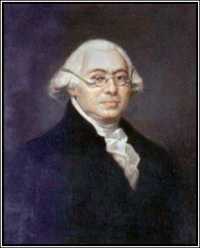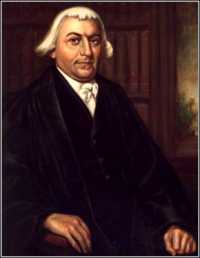A Biography of James Wilson (1742-1798)
 The name of James Wilson might not be very familiar, although this man was one of the people who made the difference in swaying the minds of the American colonists.
The name of James Wilson might not be very familiar, although this man was one of the people who made the difference in swaying the minds of the American colonists.
James Wilson was born in Scotland on September the 14th, 1742. Here, he attended the Universities of St.Andrews, Glasgow, and Edinburgh. He never finished his studies, as he sailed for the New World in 1765. Aided by some letters of introduction, he became a tutor with the College of Philadelphia. He received an horonorary M.A. shortly thereafter. In November 1767, he was admitted to the bar, and thus pursuing his recent-born interest in the law. He set up his own practice in Reading in the year 1768. He was quite successfull, as he handled nearly half of the cases charged in the country court.
During one of the following years he married Rachel Bird.
In 1774, he wrote an essay with the title:" Considerations on the Nature and Extent of the Legislative Authority of the British Government." He distributed this article among the members of the First Continental Congress. Within those pages, he set down a number of arguments which severely challenged the parliamentary authority over America. In the final conclusion of this manuscript, he states that Parliament han no power whatsover over the American colonies. Although he accepted in some ways the power of the Monarch, he would not subject himself to the whims of Parliament, in which the colonies had no representation. His manuscript was read in both America and England, and created quite a stir. He was one of the first to ever voice these opinions in a sensible, well-argumented manner. To quote from the Declaration of Independence:"All the members of the British Empire are distinct states, independant of each other, but connected together under the same souvereign." The previous example is to illustrate the impact Wilson's statements made.
As a member of the Pennsylvanian Provincial Congress, he made a passionate speech about the possibility of an unconstitutional act made by Parliament. Judicial Review, the American system of checking governmental acts with the Constitution, was on it's way.
In the same year, 1775, he signed the Declaration of Independance as a member of the Second Continental Congress. According to sources, it seems he hesitated at first, but signed anyway. This was due to the fact that he was a representative of the Middle States, where opinions about independance differed. But by signing the Declaration, he broke the deadlock the Pennsylnanian delegation was in. His signature made sure Pennsylvania voted for independance.
During the next years he was an occasional member of the Continental Congress, and was present at the Constitutional Convention of 1787, which assembled with the purpose of drafting The Constitution of the United States of America. Here he was a very influential figure, whose ideas where heavily incorporated in one of the most important documents in history. Thus the Constitution bears his signature.
In 1789, he became a professor of law at the University of Pennsylvania, and in the same year was appointed associate justice of the Supreme Court. In this role, he did not shine as brightly as he used to do, as he did not voice any new or ground-breaking judicial ideas.
He deceased August 21, 1798; a widower with six children.
Alternative biography
There is another biography of James Wilson, which differs on some topics:
 Wilson was born in 1741 or 1742 at Carskerdo, near St. Andrews, Scotland, and educated at the
universities of St. Andrews, Glasgow, and Edinburgh. He then emigrated to America, arriving in
the midst of the Stamp Act agitations in 1765. Early the next year, he accepted a position as Latin
tutor at the College of Philadelphia (later part of the University of Pennsylvania) but almost
immediately abandoned it to study law under John Dickinson.
Wilson was born in 1741 or 1742 at Carskerdo, near St. Andrews, Scotland, and educated at the
universities of St. Andrews, Glasgow, and Edinburgh. He then emigrated to America, arriving in
the midst of the Stamp Act agitations in 1765. Early the next year, he accepted a position as Latin
tutor at the College of Philadelphia (later part of the University of Pennsylvania) but almost
immediately abandoned it to study law under John Dickinson.
In 1768, the year after his admission to the Philadelphia bar, Wilson set up practice at Reading, Pa. Two years later, he moved westward to the Scotch-Irish settlement of Carlisle, and the following year he took a bride, Rachel Bird. He specialized in land law and built up a broad clientele. On borrowed capital, he also began to speculate in land. In some way he managed, too, to lecture on English literature at the College of Philadelphia, which had awarded him an honorary master of arts degree in 1766.
Wilson became involved in Revolutionary politics. In 1774 he took over chairmanship of the Carlisle committee of correspondence, attended the first provincial assembly, and completed preparation of Considerations on the Nature and Extent of the Legislative Authority of the British Parliament. This tract circulated widely in England and America and established him as a Whig leader.
The next year, Wilson was elected to both the provincial assembly and the Continental Congress, where he sat mainly on military and Indian affairs committees. In 1776, reflecting the wishes of his constituents, he joined the moderates in Congress voting for a 3-week delay in considering Richard Henry Lee's resolution of June 7 for independence. On the July 1 and 2 ballots on the issue, however, he voted in the affirmative and signed the Declaration of Independence on August 2.
Wilson's strenuous opposition to the republican Pennsylvania constitution of 1776, besides indicating a switch to conservatism on his part, led to his removal from Congress the following year. To avoid the clamor among his frontier constituents, he repaired to Annapolis during the winter of 1777-78 and then took up residence in Philadelphia.
Wilson affirmed his newly assumed political stance by closely identifying with the aristocratic and conservative republican groups, multiplying his business interests, and accelerating his land speculation. He also took a position as Advocate General for France in America (1779-83), dealing with commercial and maritime matters, and legally defended Loyalists and their sympathizers.
In the fall of 1779, during a period of inflation and food shortages, a mob which included many militiamen and was led by radical constitutionalists, set out to attack the republican leadership. Wilson was a prime target. He and some 35 of his colleagues barricaded themselves in his home at Third and Walnut Streets, thereafter known as "Fort Wilson." During a brief skirmish, several people on both sides were killed or wounded. The shock cooled sentiments and pardons were issued all around, though major political battles over the commonwealth constitution still lay ahead.
During 1781 Congress appointed Wilson as one of the directors of the Bank of North America, newly founded by his close associate and legal client Robert Morris. In 1782, by which time the conservatives had regained some of their power, the former was reelected to Congress, and he also served in the period 1785-87.
Wilson reached the apex of his career in the Constitutional Convention (1787), where his influence was probably second only to that of Madison. Rarely missing a session, he sat on the Committee of Detail and in many other ways applied his excellent knowledge of political theory to convention problems. Only Gouverneur Morris delivered more speeches.
That same year, overcoming powerful opposition, Wilson led the drive for ratification in Pennsylvania, the second state to endorse the instrument. The new commonwealth constitution, drafted in 1789-90 along the lines of the U.S. Constitution, was primarily Wilson's work and represented the climax of his 14-year fight against the constitution of 1776.
For his services in the formation of the federal government, though Wilson expected to be appointed Chief Justice of the Supreme Court, in 1789 President Washington named him as an associate justice. He was chosen that same year as the first law professor at the College of Philadelphia. Two years later he began an official digest of the laws of Pennsylvania, a project he never completed, though he carried on for a while after funds ran out.
 Wilson, who wrote only a few opinions, did not achieve the success on the Supreme Court that his capabilities and experience promised. Indeed, during those years he was the object of much criticism and barely escaped impeachment. For one thing, he tried to influence the enactment of legislation in Pennsylvania favorable to land speculators. Between 1792 and 1795 he also made huge but unwise land investments in western New York and Pennsylvania, as well as
in Georgia. This did not stop him from conceiving a grandiose but ill-fated scheme, involving vast sums of European capital, for the recruitment of European colonists and their settlement in the West. Meantime, in 1793, as a widower with six children, he remarried to Hannah Gray; their one son died in infancy.
Wilson, who wrote only a few opinions, did not achieve the success on the Supreme Court that his capabilities and experience promised. Indeed, during those years he was the object of much criticism and barely escaped impeachment. For one thing, he tried to influence the enactment of legislation in Pennsylvania favorable to land speculators. Between 1792 and 1795 he also made huge but unwise land investments in western New York and Pennsylvania, as well as
in Georgia. This did not stop him from conceiving a grandiose but ill-fated scheme, involving vast sums of European capital, for the recruitment of European colonists and their settlement in the West. Meantime, in 1793, as a widower with six children, he remarried to Hannah Gray; their one son died in infancy.
Four years later, to avoid arrest for debt, the distraught Wilson moved from Philadelphia to Burlington, NJ. The next year, apparently while on federal circuit court business, he arrived at Edenton, NC, in a state of acute mental stress and was taken into the home of James Iredell, a fellow Supreme Court justice. He died there within a few months. Although first buried at Hayes Plantation near Edenton, his remains were later reinterred in the yard of Christ Church at Philadelphia.
